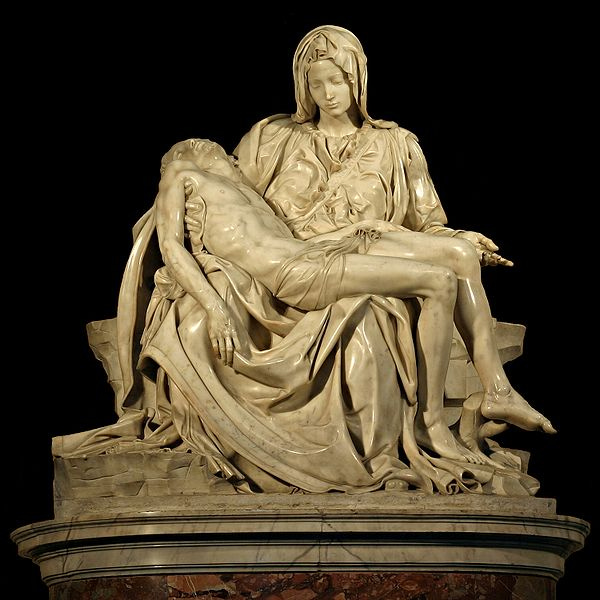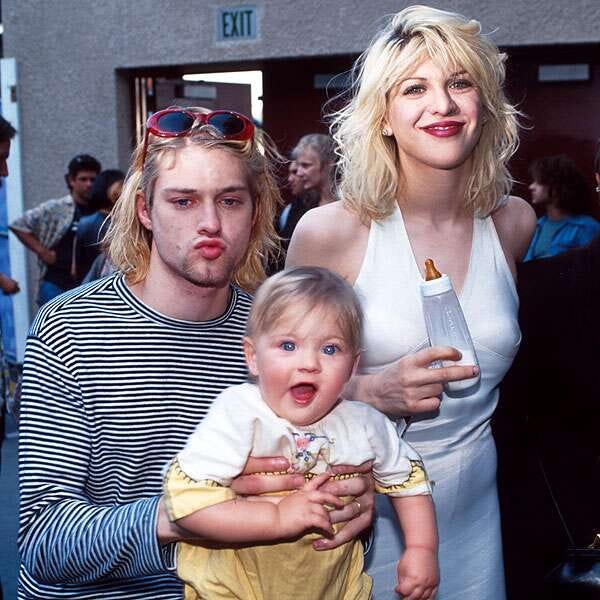Rarely is someone expected to be perfect the way mothers are. In Noah Baumbauch’s 2019 movie “Marriage Story,” a divorce lawyer played by Laura Dern tells it best to her prospective client, a mother splitting up with her child’s father. Whereas “the idea of a good father was only invented like 30 years ago,” women have had Mother Mary as their model for the past 2,000 years. “She’s a virgin who gives birth,” Dern explains, “unwaveringly supports her child, and holds his dead body when he’s gone”.
She also has it both ways. She is able to be the mother Selene, the goddess of the full moon and motherhood, while also maintaining her new moon virginal status, like Artemis the untouched huntress, devoid of wanting. In the Pietá, Michelangelo’s statue of Mary holding her son after his crucifixion, she looks as youthful as she did 33 years ago, her son looking older then she but preternaturally small in her arms. It’s as if she was preserved in amber between his birth and death, never asking for anything before she is needed by her son once again.
We, notice, then, when a woman does not fit into this outsize role, as they tend to do, often taking glee in revealing her inadequacies. Even before Courtney Love began dating Kurt Cobain they were two of the most talked-about figures of the early 1990s for their drug-use, countercultural music and debauched lifestyles. By the time Love and Cobain married, Nirvana had sold millions of copies of their 1991 Nevermind, cementing the band’s status and skyrocketing grunge onto the main stage. Love, who’s own band Hole was becoming a force in their own right, was not shy that she, too, wanted what her soon-to-be husband had. But more than fame and success, Love wanted to a family. She wanted what no one else thought she deserved: to be a mother herself.
The moon is interested in such hunger. Like our appetites, the moon represents everything that changes, from the shifting tides to the swelling belly of a pregnant woman. This divine, unchanging quality we impart onto motherhood is antithetical to understanding the moon, but nonetheless woven into maternal archetypes and expectations, unless the woman is to become monstrous. “The notion that we can or should be present all the time is a particularly solar one, for the Sun is always full and shining” Dana Gerhard points out in her article about the Moon. “We bring this expectation to work and into all our relationships, especially our loves.” A good mother always maintains the image; a bad mother lets the facade crack. We see this dichotomizing most clearly, however, when someone fails to uphold it, when their mothering is not sufficient.
Love gave birth to her and Cobain’s daughter, Frances Bean, in 1993. Due to a Vanity Fair article alleging drug use during the pregnancy (though Love says she stopped using when she learned she was pregnant), she had her child taken away upon delivery.
Rather than hash out her private life, I want to focus on what should be her lasting legacy, what made her famous in the first place: her music. Love is a Cancer. Both her Sun and Moon are in this sign of the Crab, which is ruled by the Moon. Love wrestles with these archetypes all over her music, especially her 1994 magnum opus, Live Through This. Much of it contains “lunar” themes, like these (keywords taken from Vettius Valens):
The Body
“ I am doll eyes, doll mouth, doll legs
I am doll arms, big veins, dog beg” (Doll Parts)
“They say I'm plump But I threw up all the time” (Plump)
The Mother, Conception
‘I'm eating you / I'm overfed
Your milk's in my mouth
It makes me sick” (Plump)
I want my baby
Where is the baby?
I want my baby
Who took my baby? (“I Think That I Would Die”)
Nurture, Housekeeping,
“And I don't do the dishes
I throw them in the crib” (“Plump”)
I don't really miss God
But I sure miss Santa Claus (“Gutless”)
He said, "I'm your lover, I'm your friend
I'm pure,” and he hits me again
The Queen, the Mistress of the House
“I'm Miss World
Somebody kill me” (Miss World)
She walks over me
She walks over me (“She Walks Over Me”)
Possessions, Fortune,
I‘ve got a blister from
Touching everything I see (“Softer, Softest”)
There is no milk! (“I Think That I Would Die”)
While she explores many lunar archetypes— the nurturer, the pageant queen— she tends to expose the dark underbelly of attempting to embody such transcendent roles.
Even when she does embody proper lunar virtues, like beauty and feminine charm, she only shows what she stands to lose from such receptive roles.
On the opening track, “Violet,” Love is meeting a man, a lover presumably, on an “amethyst” night. In the chorus she exhorts him to “go on, take everything, take everything/ I want you to”. And while she is willing to give it all to him, “When they get what they want...they never want it again”. Love, eternally giving, becomes less valuable the more she gives, the man cutting off his desire for her once she’s used up. In the opening verse, she is chided for this yielding, being told she “should learn how to say no”. But Love was raised a woman, beholden to the moon.
“In the same way the infant does not realize he or she is separate from the mother,” Demetra George explains, “the Moon does not recognize separateness. ” As a woman we are expected to give, even when it becomes violent, as the slant rhyme of the title of the song hints at. While others may know where you end and they began, someone as lunar as Courtney Love has difficulty when giving becomes self-abnegation.
A similar merging of love and violence occurs during the bridge of “Asking For It,” a song inspired by a stage-diving experience where Love’s clothes were torn and her body violated as she was passed around the audience. “Was she asking for it?” Love repeats in the chorus until her sing-song whispers become screams. It reminds me of the lunar figure, Hekate, a lunar underworld goddess who was known, among other things, for being the sole witness to Persephone’s abduction by Hades. Her testimony of the event was what allowed Zeus to find and bring the maiden back to her mother, at least half of the time.
Love tells us, in no uncertain terms what she would give in exchange for someone to see her through her tragedies. “If you live through this me,” she sings at the bridge, “I swear that I will die for you”. She would give her life to be seen, to be stuck with, even through her own changes.
But just as the Moon deals with nurturance and mothering, she also deals with its lack. Though Courtney wanted to provide a loving, stable life for her husband and daughter, the judgment and scrutiny from the public eye and media, along with her own troubled childhood, made this increasingly difficult. But even that doesn’t stop the hunger. Love didn’t just want to be the wife of a rock star; she wanted to be one herself. One of her most famous quotes is: “Don't date the captain of the football team; be the captain of the football team”.
Interesting, then, that Hekate is the dark-faced Moon goddess most associated with desire. Unlike any other deity, Zeus granted Hekate certain privileges, namely dominion over air, earth and sea as well as the ability to grant her supplicants whatever they desire. One of Love’s most famous lyrics is: “I want to be the girl with the most cake”. We vilified her for it because we like our lunar figures well-contained receptacles. We like them to respond to our moods without asking for more in return.
But even if she wasn’t always perfect or successful, she still tried, subverting the lunar archetypes that didn’t want her and letting her hunger have a place, along with all that she gives both with her body and her music.








Ugh I've loved this 🤍🤍🤍 so much to think about, thank you!